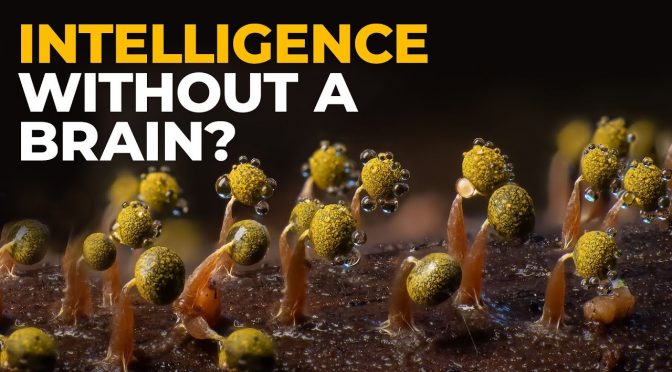In an era where nature continues to astound us with its profound complexity and intelligence, the phenomenal video by Real Science titled “The Insane Biology of: Slime Mold” brings to light an organism that encapsulates this sentiment – the humble slime mold. This article, inspired by Real Science’s informative and captivating presentation, dives deep into the world of this brainless protist. It unravels the intricate layers of slime mold intelligence, their exceptional problem-solving abilities, and the philosophical conundrums their existence poses, demonstrating that even the simplest life forms can harbor profound wisdom.
The Enigmatic Life of Slime Molds
Slime molds, such as the plasmodial Physarum polycephalum, are curious organisms that defy conventional biological classifications. They lie within the realm of protists, a kingdom inhabited by the misfits of the natural world, organisms that don’t fall comfortably into the categories of animals, plants, or fungi. Despite their minimalistic structure, slime molds exhibit behaviors that are uncannily complex, navigating their environment with an apparent understanding of risk, hunger, and the quality of food.
These enigmatic creatures come in various forms, most notably as cellular and plasmodial slime molds. Cellular slime molds lead solitary lives until food scarcity compels them to congregate and form a multicellular entity. Plasmodial slime molds, on the other hand, exist as a single, giant cell encompassing multiple nuclei. They traverse the forest floor in search of bacteria, their primary food source, extending tendrils in all directions and constantly altering their form.
Slime Mold Problem-Solving
What makes slime molds particularly fascinating is their ability to employ a form of intelligence without the presence of a brain. The plasmodial slime mold, Physarum polycephalum, is an adept problem solver, capable of optimizing its path by avoiding its own slime trail, a feat akin to solving the famous traveling salesman problem.
In a testament to their complex behavior, scientists have utilized slime molds to tackle real-world optimization issues. From designing efficient transportation networks to identifying the shortest path between cities, these simple life forms have demonstrated their potential for providing unconventional yet effective solutions.
Slime Molds in Technological Advancements
Beyond problem-solving, slime molds have proven to be a valuable asset in the realm of technology. Inspired by their behavior, researchers have developed algorithms that outperform traditional computational methods when it comes to optimization problems.
The true marvel, however, lies in the creation of a biological computer chip. In a groundbreaking study, slime mold tubes coated with conductive material were used to mimic the behavior of these organisms. This remarkable endeavor showcases the vast potential of primitive intelligence, opening up avenues for new technological advancements.
Philosophical Implications of Slime Mold Intelligence
The slime mold’s unique form of intelligence urges us to reevaluate our understanding of cognition and problem-solving. Their abilities challenge the rush towards advanced artificial intelligence, suggesting that simple organisms can provide effective solutions.
The philosophical ramifications of such intelligence are profound. They pose fundamental questions about the nature of intelligence and cognition, pushing us to reconsider the necessity of complex structures like the brain for problem-solving.
The phenomenon of slime mold intelligence underscores the elegance of nature’s simplicity and the profound wisdom embedded within it.

